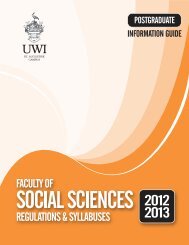Faculty of Humanities and Education (Postgraduate) - The University ...
Faculty of Humanities and Education (Postgraduate) - The University ...
Faculty of Humanities and Education (Postgraduate) - The University ...
You also want an ePaper? Increase the reach of your titles
YUMPU automatically turns print PDFs into web optimized ePapers that Google loves.
112<br />
POSTGRADUATE REGULATIONS & SYLLABUSES 2012 - 2013<br />
THE FACULTY OF HUMANITIES & EDUCATION<br />
Recommended Reading<br />
Books<br />
Barker, T. E., Roger, E. M., & Sopory, P. (1992). Designing health<br />
communication campaigns: What works? CA: Sage. (ISBN:<br />
0803943326)<br />
Simpson, A., & Heap, B. (2002). Process drama: A way <strong>of</strong> changing<br />
attitudes. Stockholm: Save the Children, Sweden. (ISBN:<br />
9173210579)<br />
Downie, R. S., Tannahill, C., & Tannahill, A. (1996). Health promotion:<br />
models <strong>and</strong> values. (2nd Ed.) NY: Oxford <strong>University</strong> Press.<br />
(ISBN: 0192625918)<br />
Freund, P. E. S., McGuire, M. B., & Podhurst, L. S. (2003). Health,<br />
illness, <strong>and</strong> the social body: A critical sociology (4th Ed.). NJ:<br />
Prentice Hall. (ISBN: 013098230X)<br />
Glanz, K., Rimer, B. K., & Lewis, F. M. (Eds.). (2002). Health behaviour<br />
<strong>and</strong> health education: <strong>The</strong>ory, research, <strong>and</strong> practice (3 rd Ed.).<br />
San Francisco: Jossey-Bass. (ISBN: 0787957151)<br />
Morgan, O. (Ed.). (2005). Health issues in the Caribbean. Jamaica:<br />
Ian R<strong>and</strong>le. (ISBN: 9766372136)<br />
Weare, K. (2000). Promoting mental, emotional & social health:<br />
A whole school approach. London: Routledge. (ISBN:<br />
0415168759)<br />
World Bank. (2003). Caribbean youth development: Issues <strong>and</strong><br />
policy directions. Washington, DC: World Bank. (ISBN: NA)<br />
World Health Organization (1997). Promoting health through<br />
schools. WHO Technical Report Series, 870. Geneva: WHO.<br />
(ISBN: 9241208708)<br />
World Health Organization (2001). Evaluation in health<br />
promotion: Principles <strong>and</strong> perspectives. WHO Regional<br />
Publications European Series, no. 92. Denmark: WHO. (ISBN:<br />
9289013591)<br />
Journals<br />
Journal <strong>of</strong> Adolescent Health<br />
American Journal <strong>of</strong> Public Health<br />
Journal <strong>of</strong> School Health<br />
Databases<br />
Sociological abstracts (soci<strong>of</strong>ile) (NISC)<br />
AIDSearch (MEDLINE AIDS/HIV Subset, AIDSTRIALS &<br />
AIDSDRUGS) FREE (NISC)<br />
Child Abuse, Child Welfare & Adoption (NISC)<br />
Gender Studies Database (NISC)<br />
Websites<br />
www.who.org<br />
www.unaids.org<br />
www.who.int/healthpromotion/conferences/previous/ottawa/<br />
en/index.html<br />
www.who.int/healthpromotion/conferences/6gchp/bangkok_<br />
charter/en/index.html<br />
www.who.int/healthpromotion/en/<br />
www.caricom.org<br />
www.unesco.org<br />
www.unfpa.org<br />
www.unicef.org<br />
www.undp.org<br />
www.nlm.gov<br />
www.cdc.gov<br />
www.social-research.org<br />
6.4 Fundamentals <strong>of</strong> <strong>Education</strong>al Research 1 <strong>and</strong> 11<br />
Overview <strong>of</strong> Courses<br />
<strong>The</strong> two educational research courses provide a general<br />
introduction to the philosophical foundations <strong>and</strong><br />
methodological strategies <strong>of</strong> research in education. <strong>The</strong>y<br />
explore the nature <strong>of</strong> educational research <strong>and</strong> the origins<br />
<strong>and</strong> uses <strong>of</strong> different research methodologies. Specifically,<br />
the courses focus on educational research informed by the<br />
empirical-analytical <strong>and</strong> naturalistic traditions.<br />
A prominent feature <strong>of</strong> these courses will be small group,<br />
interactive sessions designed to assist students in the<br />
identification <strong>and</strong> formulation <strong>of</strong> research problems <strong>and</strong> issues.<br />
A guiding principle is that education is an applied discipline <strong>and</strong><br />
that educational research must be driven by a need to improve<br />
education in certain justifiable ways. Thus, the courses will treat<br />
with both the technical side <strong>of</strong> research as well as its ideological<br />
dimensions.<br />
EDRS 6208 - Fundamentals <strong>of</strong> <strong>Education</strong>al Research I<br />
(4 credits)<br />
OBJECTIVES<br />
Participants will be able to:<br />
(1) describe the nature <strong>of</strong> educational research<br />
(2) use educational theory in order to select <strong>and</strong> identify<br />
significant research issues<br />
(3) formulate research problems<br />
(4) design appropriate tools <strong>and</strong> instruments for investigation<br />
(5) use the various statistical forms <strong>of</strong> data analysis<br />
(6) reflect on <strong>and</strong> analyze issues <strong>and</strong> dilemmas in educational<br />
research<br />
(7) develop competence in the interpretation <strong>and</strong> evaluation<br />
<strong>of</strong> educational research findings<br />
CONTENT<br />
• <strong>The</strong> nature <strong>of</strong> educational research.<strong>Education</strong> as an applied<br />
discipline. <strong>The</strong> relevance <strong>of</strong> educational theory to research.<br />
• Sources<strong>of</strong>evidenceinresearch.Identifying<strong>and</strong>formulating<br />
research problems. Selection <strong>of</strong> methods in educational<br />
research.<br />
• Research <strong>and</strong> knowledge utilization. Reporting <strong>of</strong><br />
educational research.<br />
• Designing <strong>and</strong> implementing research in the empiricalanalytical<br />
tradition. Positivist approaches to research :<br />
• the research plan: ethical considerations,<br />
sampling design, data collection<br />
• descriptive research<br />
• experimental research<br />
• descriptive data analysis<br />
• measures <strong>of</strong> central tendency<br />
• measures <strong>of</strong> variability<br />
• measures <strong>of</strong> relationship – correlations<br />
• inferential data analysis<br />
• testing statistical significance<br />
• non•parametric tests<br />
• use <strong>of</strong> computer s<strong>of</strong>tware in data analysis<br />
• preparing a research proposal

















